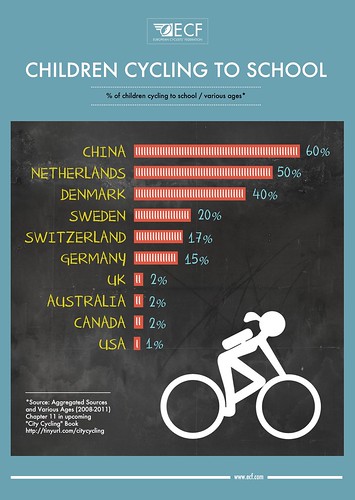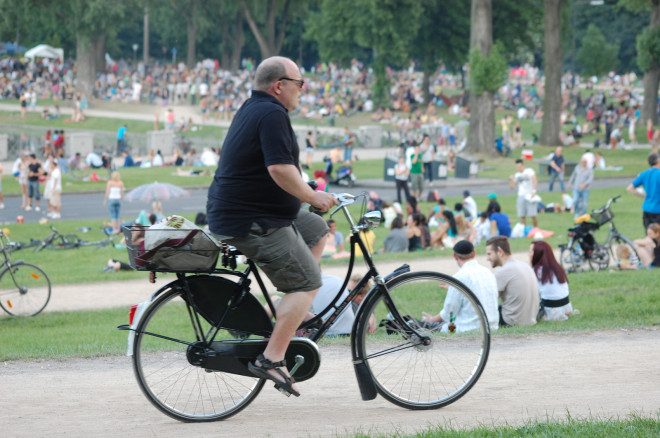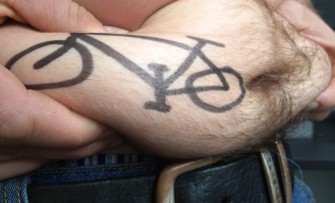
Fat Europe: Can Bicycles And Technology Save The Day?
As Europeans get fatter, technology may just get more people on bikes.
Obesity levels continue to rise across Europe, and statistics almost beggar belief. Many studies point to health care costs in excess of €10 billion per annum in Europe and the World Health Organization states that 10-15% of annual deaths can be linked to bulging waistlines.
So what’s the EU going to do about it?
A conference organised this week by the European Commission is looking reverse this trend but with a slight twist: they want technology to play a big role.
Held in Verona, Italy, the “Countering Obesity” conference is looking to see how Information and Communication Technologies (ICT) can create behavioural change. Speakers include industry representatives from Microsoft, academics, health researchers and bicycle advocates. It may well be the latter has the easiest solutions on offer.
“One of the most simple and cost-effective solutions to reducing obesity is getting people on bicycles, so we’ve developed a concept using electronic chips to reward cyclists for travelling by bike,” explains Troels Andersen, a speaker at the conference and an expert from the Danish Cycling Embassy.
In the city of Frederica Denmark, Andersen came up with the concept of “Cykel Skore”, which created 18 'checkpoints' at schools, workplaces cinemas etc. and gave radio frequency identification (RFID) tags to cyclists. Participants were then tracked and rewarded by the number of kilometres they cycled. The program has been so successful that it will soon be rewarding their 1,111 participant in a city with a population of less than 40,000 .
“If you want to get people cycling, you have to start young, and you need a cultural shift in the way families move. Behavioral economics shows that positively rewarding people is much more powerful than punishing them.”
The original idea is also being expanded across Europe through the EU-funded “B-Track-B” project with another six European cities getting ready to implement the system. The project is also developing a Smartphone app, meaning there would be no need for tags or checkpoints.
 One of the RFID tags used in the Cykel Score Program in Fredericia, Denmark.
One of the RFID tags used in the Cykel Score Program in Fredericia, Denmark.
No Children Cycling
 Perhaps part of the upsurge in obesity in recent years is because the number of children cycling has plummeted. Within the last 30 years, the number of kids that walk or cycle to school has decreased from 82% to 14%. While some countries such as the Netherlands have high levels of children cycling to school (50%), others such as the US (1%), Canada (2%), the United Kingdom (2%) and Australia (2%) are lagging.
Perhaps part of the upsurge in obesity in recent years is because the number of children cycling has plummeted. Within the last 30 years, the number of kids that walk or cycle to school has decreased from 82% to 14%. While some countries such as the Netherlands have high levels of children cycling to school (50%), others such as the US (1%), Canada (2%), the United Kingdom (2%) and Australia (2%) are lagging.
“Some British studies show that female obesity is starting with 9 year olds. That’s actually scary, and that’s why we need projects like B-Track-B,” explains Kevin Mayne, Director of Development at the European Cyclists’ Federation, and former head of CTC, the United Kingdom’s national cyclists’ association.
“In the UK. there are 14 year old girls that can’t pass the fitness test for 65 year olds that we used to use. You know what that test is? Walking up a flight of stairs without using a hand-rail to pause for breath on the way up.”
If its technology that has made today’s children fatter, it may just be technology that can help them trim back down.
Interested in getting your city involved in the “B-Track-B” project? Send an email to ECF project manager Henk Hendriks. He’s currently on the look-out for interested cities that want to try this out. You can also visit the project page on ECF’s website.

About the Author
Henk Hendriks currently works at both Fietserbond, the Netherlands's national cycling association and the European Cyclists' Federation (ECF) as the project manager for B-Track-B. He has worked for 11 years internationally in community development and education before joining Fietsersbond 5 years ago. His work at Fietsersbond includes policy and lobby projects targeted to improve urban planning for cyclists.
Contact the author
Recent news!
Upcoming events
Contact Us
Avenue des Arts, 7-8
Postal address: Rue de la Charité, 22
1210 Brussels, Belgium











